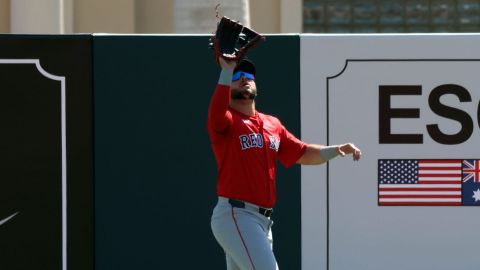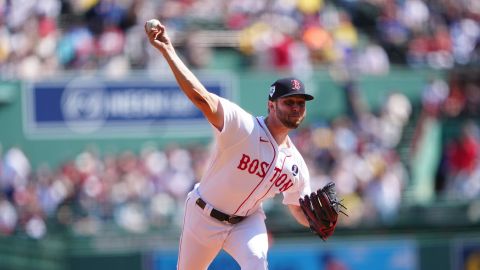 There’s going to be a celebration in Boston within the next couple of days. We just don’t know who will be doing the celebrating.
There’s going to be a celebration in Boston within the next couple of days. We just don’t know who will be doing the celebrating.
Right now, the Red Sox look poised to be the life of the party. They hold a 3-2 advantage in the World Series after taking back-to-back games in St. Louis, and one win is all that separates Boston from clinching its first World Series title at Fenway Park since 1918.
The Cardinals fully intend to crash that party, though. While St. Louis has been pushed to the brink of elimination, the Cardinals remain confident that they’ll be the ones celebrating on the Fenway field this week.
“Once again, we were in that spot backed up where we had to have a win. It’s not something we haven’t seen before, and the guys know what we have to do. We have to play the game,” Cardinals manager Mike Matheny said after Game 5 on Monday. “They have to lock arms, trust each other and play the game the right way. Most of it is going to be the mentality of not buying into any kind of stats, any kind of predictions, any kind of odds. And go out and play the game.”
A World Series champion will be crowned in Boston either Wednesday or Thursday. But you’re all champions in my book, so let’s swan dive into a special Fall Classic edition of the mailbag.
What are the key changes that the Red Sox have to make to defeat Michael Wacha and the Cardinals in Game 6?
— Stuart Silverstein
Honestly, I don’t think that the Red Sox’ offense needs to make too many adjustments over the last time Boston faced Michael Wacha.
While Wacha enjoyed success in Game 2, the Red Sox still forced him to throw 114 pitches over six innings. The rookie issued four walks, and said after the game that it was in large part because the Red Sox didn’t chase pitches that the Dodgers and Pirates had earlier in the postseason. I fully expect the Red Sox to once again try to get into the Cardinals’ bullpen as early as possible, although given Wacha’s Game 2 walk total, it’s also possible that he’ll come out pounding the strike zone, in which case Boston can’t be afraid to grip it and rip it.
I also think that the Red Sox should try to be more aggressive on the bases whenever possible in Game 6. It seems that Boston has been a bit hesitant — which comes with the territory when you’re facing Yadier Molina — but putting the wheels in motion could impact Wacha’s effort to settle into a zone.
Do you think that a day between games will cause a drop in momentum?
— Roy Smith IV
No, I don’t.
And it’s not because I think the Red Sox’ momentum is some unstoppable force. It’s because I don’t think momentum means anything in this series. The team that wins Game 6 will do so because they played better Wednesday night.
Game 3 was lost when Jarrod Saltalamacchia threw to third base. The runner (Allen Craig) was past the shortstop position before Saltalamacchia’s throw. There are two outs and Koji Uehara on the mound. To me, this was a bad play by Salty. He’s should have relied on the pitcher’s arm — not his — to end that inning.
–Bill, Dundee, Oregon.
Preach on, Bill.
While this isn’t a question, I appreciate the feedback, and I totally agree with you. Jarrod Saltalamacchia was acting on instincts more than anything, but there’s no way he should have attempted that throw in Game 3. It was a low-percentage play regardless of how hobbled Allen Craig is on the bases, and, like you said, the Red Sox would have been better off relying on Koji Uehara to pitch them into extra innings.
I also think that Will Middlebrooks had a chance to catch Salty’s throw. It’s hard to fault him too much, but it’s a play that’s makeable. And as an infielder, you’ve got to do anything you can to ensure that ball doesn’t get past you. Even getting the slightest bit of leather on it keeps Craig at third base.
The obstruction call in Game 3 certainly had some Boston fans hot under the collar (and perhaps still does), but when you consider what led to the whole debacle, the Red Sox probably got what they deserved.
David Ortiz’s speech really seemed to change the series. Do you think he should be given the captain’s “C” next year?
–Scott, Billerica, Mass.
I’m not big on the whole captain’s “C.” I know it’s something that’s been discussed among fans, particularly in regards to Dustin Pedroia, but I think that natural leaders will shine with or without an extra letter on the front of their uniforms.
If someone on the Red Sox eventually gets the “C,” great. If not, I don’t think it impacts the organization whatsoever. It’s a symbolic gesture more than anything, and the Ortiz’s, the Pedroia’s and the Jon Lester’s of the world know where they stand.
That being said, I think Ortiz’s speech during Game 4 of the World Series really showed two things.
1) Ortiz has the utmost respect of his teammates, and his word carries a tremendous amount of weight.
Granted, this isn’t something that’s entirely new, as Ortiz has been considered a vocal leader of this group since Day 1. But listening to the players describe Ortiz and what it’s like to share a clubhouse with him during a World Series run makes you realize just how influential a player he is. Ortiz’s teammates seem to have great admiration for the slugger’s accomplishments, and they have really followed his lead throughout this postseason.
And…
2) The selflessness and character of this team really transcends words.
Could you imagine Ortiz pulling aside someone like Adrian Gonzalez, Carl Crawford or Josh Beckett in the middle of a game for a pep talk? Of course not. Yet this group seems so focused on the task at hand that nothing outside of winning the World Series seems to matter.
The players that comprise this year’s Red Sox team checked their egos at the door when they arrived in spring training, and moments like Ortiz’s Game 4 speech really reflect that. Ortiz has been around and has been in these types of situations before, so he knows what he’s talking about. The Red Sox realize that, and they’re more than willing to use his past experiences to their collective advantage.
Ortiz’s speech was the mark of a good leader, but it also takes a special and motivated group to ensure that his valuable wisdom doesn’t fall on deaf ears.
After Game 3, all we heard was that in 16 of the last 18 [series tied 1-1], the winner of Game 3 went on to win the series. What do the stats say now?
— Paul Burns
The stats say that teams that win Game 5 in a best-of-seven World Series tied 2-2 have won 26 of 40 series (65 percent).
But they also say, “Don’t count your chickens before they hatch.”
Do you think that MLB will ever make the designated hitter standard for both leagues or have the pitcher bat in both leagues? The way it’s done right now just doesn’t seem right.
–William Sheppard
Never say never, I guess. But I really don’t see it happening any time soon.
If Major League Baseball eventually makes a change, it will most certainly involve the DH being added to the National League — not the DH being removed from the American League. And I’m all for it.
Not only does the sight of watching most pitchers fumble all over themselves in the batter’s box get old, but the year-long interleague schedule means AL teams are forced to discard the DH at random points throughout the year. The fact that the Red Sox had to play a series in Colorado during the final week of the regular season — when they could have conceivably been battling for a playoff spot — is ludicrous.
Most AL teams are at a distinct disadvantage when it comes to interleague play. They build their teams a certain way — with a DH — and then are suddenly, at certain points throughout the season, expected to make major changes to their lineup. It’s especially bothersome when a team — like the Red Sox — relies heavily on the production of its designated hitter.
The DH also lengthens careers, as aging veterans who are capable of producing offensively can slide into the role, and the sport could probably benefit from an uptick in offense as it looks to attract younger viewers.
The whole strategy aspect that comes with the National League style of play is nice, but I’m more than willing to concede that in order to create a level playing field across both leagues. I mean, does anyone really want to see a starting pitcher lifted prematurely in favor of some boob off the bench?
Let’s have the pitchers put the lumber away and focus on emptying the tank doing what they’re paid to do — on both sides of the fence.
Can Jimmy Fallon and Drew Barrymore run across the field at some point?
— Shane Devereux
Whatever it takes.
Have a question for Ricky Doyle? Send it to him via Twitter at @TheRickyDoyle or send it here.




